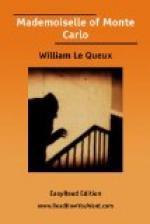“This is the gentleman who sought me out in Nice, and first told me of your peril, Hugh. I recognize his voice, and have to thank him for a good deal,” the girl declared.
“Really, Miss Ranscomb, I require no thanks,” the polite stranger assured her. “If I have been able to render Mr. Henfrey a little service it has been a pleasure to me. And now that you are together again I will leave you.”
“But who are you?” demanded Hugh, filled with curiosity.
“That matters not, now that you are back in England. Only I beseech of you to be very careful,” said the tall man. Then he added: “There are pitfalls into which you may very easily fall—traps set by your enemies.”
“Well, sir, I thank you sincerely for what you have done for Miss Ranscomb during my absence,” said the young man, much mystified at finding Dorise strolling at that hour with a man of whose name even she was ignorant. “I know I have enemies, and I shall certainly heed your warning.”
“Your enemies must not know you are in England. If they do, they will most certainly inform the police.”
“I shall take care of that,” was Hugh’s reply. “I shall be compelled to go into hiding again—but where, I do not know.”
“Yes, you must certainly continue to lie low for a time,” the man urged. “I know how very dull it must have been for you through all those weeks. But even that is better than the scandal of arrest and trial.”
“Ah! I know of what you are accused, Hugh!” cried the girl. “And I also know you are innocent!”
“Mr. Henfrey is innocent,” said the tall stranger. “But there must be no publicity, hence his only chance of safety lies in strict concealment.”
“It is difficult to conceal oneself in England,” replied Hugh.
The stranger laughed, as he slowly answered:
“There are certain places where no questions are asked—if you know where to look for them. But first, I am very interested to know how you got over here.”
“I went to Ostend, and for twenty pounds induced a Belgian fisherman to put me ashore at night near Caister, in Norfolk. I went to London at once, only to discover that Miss Ranscomb was at Blairglas—and here I am. But I assure you it was an adventurous crossing, for the weather was terrible—a gale blew nearly the whole time.”
“You are here, it is true, Mr. Henfrey. But you mustn’t remain here,” the stranger declared. “Though I refuse to give you my name, I will nevertheless try to render you further assistance. Go back to London by the next train you can get, and then call upon Mrs. Mason, who lives at a house called ‘Heathcote,’ in Abingdon Road, Kensington. She is a friend of mine, and I will advise her by telegram that she will have a visitor. Take apartments at her house, and remain there in strict seclusion. Will you remember the address—shall I write it down?”
“Thanks very much indeed,” Hugh replied. “I shall remember it. Mrs. Mason, ‘Heathcote,’ Abingdon Road, Kensington.”




